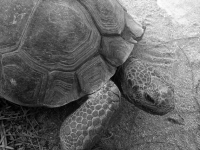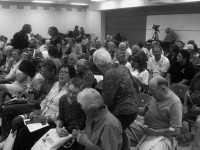Part I–Transition Joshua Tree Permaculture Meeting

I. Something so fragile and essential, I am afraid to name it
There is a nest in the cavity in my chest woven with threads of hope salvaged from the veil of optimism I used to wear, until it got caught in the conveyer belt of reproduction and ripped apart rolling into the incinerator of green capitalism. Winding my metal spanner around the gears, I loosened the bolt and pulled out the threads, pinching them between my fingers to put out the embers ignited by citizenship. I tied the threads into a sparrow-sized nest and placed inside small speckled eggs impregnated with yolks of theories spawned from a set of thinking different than the thinking that walked us into this factory in the first place. I selected the eggs by scanning their genetic codes for the ones that read the most like lines of poetry: the horizontalization of social relations, fuzzy biological sabotage, open sourcing, decomposition, suspended disbelief, ecosystem design, and permaculture. When I opened my rib cage to place the nest inside, out fell television monitors leaking heavy metals and nationalism, computers off-gassing carbon dioxide, cell phones exuding the blood of Congolese, milking machines oozing hormones and methane, cars sputtering oil and lobbyists, drones hacking up dispersants and the virus of progress, election booths crackling with market based mechanisms, and passport scanners cannibalizing the wings of human beings. I hollowed out a space and slid in the nest, relocking my chest and grinding the key to pieces between my teeth. Now I hunch my shoulders to protect the fragile shells from the brutal blows of dismissiveness and mockery that come on horseback with the crusades to colonize the mind, own the body, and put the soul to work. As fragile as this hope may be, it is also essential to continuing to live. Without hope, I would puncture like the membrane between dream and reality burst by a squad night ambush.
Katherine Ball was in residence as our HDTS Scout in Spring 2014.
The HDTS Scout Residency is dedicated to learning more about the people and places that make up our diverse and ever evolving community.
Originally from Detroit, Michigan, Katherine has worked on projects around the world, exploring alternatives to the dominant discourse. Some of these include: bicycling across the US to interview Americans working on small-scale solutions to the climate crisis, coordinating a national day of action to halt business at banks and corporations unduly influencing state laws, living in an off-grid floating island building mushroom filters to clean a polluted lake, and studying the behaviors of various species acting as the ecological counterpart to civil disobedience. An amateur in the best sense of the word, Katherine strives to give more energy to our dreams than our fears.
During her residency, Katherine engaged in a series of in-depth interviews and conversations with high desert residents, focusing on our human impact on the desert landscape. Her book represents a condensed version of those discussions, encompassing water conservation, big solar, wildlife linkages, and asks: what is a sustainable life in the desert?










